

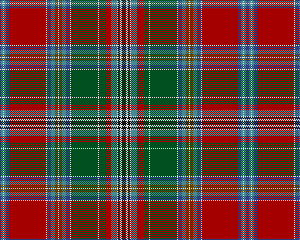 |
|
|
|
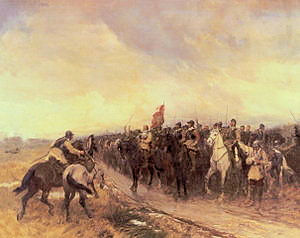 |
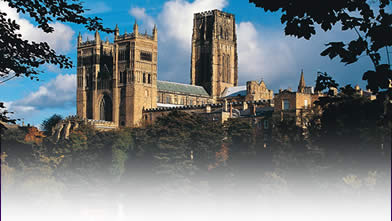 |
|
|
|

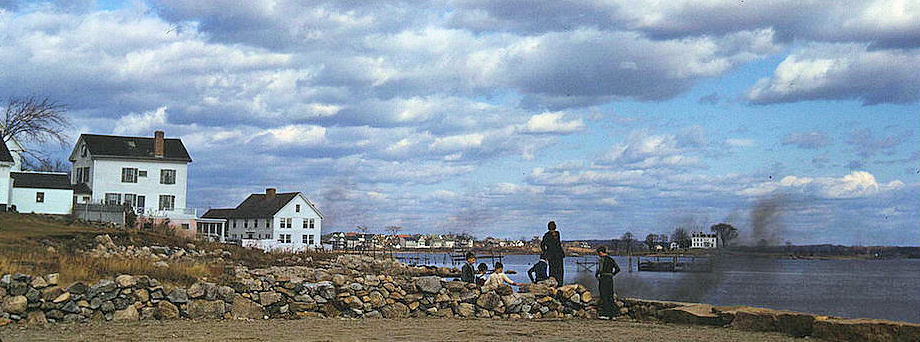
The town of New Haven began in 1638 as Quinnipiac, home of a small tribe of Native Americans, the Quinnipiack, who built their villages around the harbor, harvested seafood, hunted with bow and arrow for food and furs and grew maize, the staple of their diet. A company of 500 Puritan colonists led by Rev. John Davenport and Theophilus Eaton, a wealthy London merchant recently arrived from England to Boston, who explored the New Haven area in Aug 1637, sailed into the harbor. They soon discovered that the Quinnipiacks and other local tribes were much distressed by raiding bands of Pequots and Mohawks from surrounding areas. It was for this reason that Momauguin, the sachem of the Quinnipiacks, and other tribe members agreed to sell the tribe's land to the Puritans. In return, the settlers pledged to protect the natives and to allow them the use of the lands on the east side of the harbor.New Haven's founders not only hoped to create a Christian utopia, they also saw in New Haven's spacious harbor an opportunity to establish a commercial empire that would control Long Island Sound and possibly the coastline as far south as Delaware Bay.A Puritan minister named John Davenport led his flock from exile in Holland back to England and finally to America in the spring of 1637. The group arrived in Boston on the ship Ann on June 26, but decided to strike out on their own, based on their impression that the Massachusetts Bay Colony was lax in its religious observances.That fall Theophilus Eaton led an exploration party south to Long Island Sound in search of a suitable site. He purchased land from the Indians at the mouth of the Qinnipiac River. In the spring of 1638 the group set out, and on April 14 they arrived at their 'New Haven' on the Connecticut shore. The site seemed ideal for trade with a good port midway between Boston and New Amsterdam and access to the furs of the Connecticut River valley. However, while the colony succeeded as a settlement and religious experiment, its future as a trade center was some years away.Land was purchased from Indian tribes in Nov 1638. By 1640 a complete government had been established and the settlement, originally called Quinnipiac, Indian for "long water" or "river place," was renamed Newhaven. The town plan was based on a grid of nine squares. In accordance with old English custom, the central square, now the Green, was designated a public common. By 1641 New Haven had grown into a community of approximately 800.In 1639 they adopted a set of Fundamental Articles for self-government, partly as a result of a similar action in the river towns. A governing council of seven was established, with Eaton as chief magistrate and Cunningham as pastor. The articles required that "...the word of God shall be the only rule..." and this was maintained even over English common law tradition. Since the bible contained no reference to trial by jury, they eliminated it and the council sat in judgement. Only members of their church congregation were eligible to vote.The colony published a complete legal code in 1656, but the law remained very much church centered. Eaton stayed as governor until his death in 1658, when leadership of the Colony was given to Francis Newman, followed by William Leete in 1660. When a new royal charter was issued to Connecticut in 1692, New Haven's period as a separate colony ended and its towns were merged into the government of Connecticut in 1695.From 1701-1873 New Haven was co-capital of Connecticut, along with Hartford. |
|
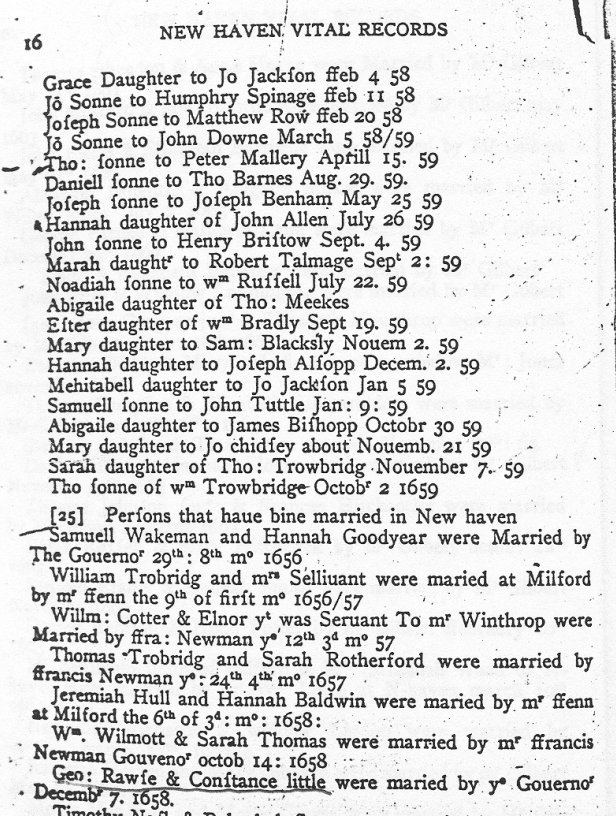 |
In the name of God, Amen. The 26 day of Oct in the Fourth Year of the Reigne of our Soverign Lord George, By the Grace of God, King of Great Britain etc. Anno Domini One thousand seven hundred and seventeen (1717). I GEORGE ROSS sick and weak in Body, But of sound and perfect understanding and memory, (thanks to almighty God above), Do make this my Last will and Testament in manner and form following. That is to say, first I Commit my Soul and Spirit into the hands of God who gave it, and my Body to the Dust whence it was Taken, to receive a Decent, Christian Burial: and for that Temporal and worldly Estate which it hath pleased God to bestow upon me, I Give, Grant, Devise, Bequeathe, and Dispose of the Sam, In manner and form following.That is to say, first, I will that all such Debts as I shall Justly owe to any Person or Persons at my Decease, Shall Be well and Truly Pay'd out of my Movable Estate, By my Executors of this my Last will and Testament herein named and appointed. --Item, I give and Bequeath unto my Loving, and well loved wife HANNAH, the one Equal third part of all my whole Movable Estate (after all my Just Debts first Discharged out of the same) To have and To hold the unto the said HANNAH my wife, her heirs and assigns for Ever. I also give and Bequeath to my said wife HANNAH the whole and sole use and involvement? of the Best Room in my now dwelling house, situate and being in Elizabeth town aforesaid (with Egress and Regress thereto and therefrom,) During the whole term that remaineth to my Widow. --Item, All the rest and remainder of my whole movable Estate I Give and Bequeath unto those of my children hereinafter mentioned, namely ABIGAIL, SARAH, GEORGE, WILLIAM, SAMUEL and HANNAH (together also with the child my wife HANNAH now goes Pregant with,) to Be Equally Divided to and among them all, part and part Equall and alike. --Item, I Give Grant Divide and Bequeath, unto My Two Sons JOHN ROSS and THOMAS ROSS, their heirs and assigns for Ever all that my now Dwelling house and home lotts situate and Being in ye Said Elizabeth Town, and also all that (_hole__) of Land which I Bought of Downs & Baker adjoining to the Lands of Thom(___hole ____) Baker (as the Deed from D Harrick for the Land) To have and to Hold these Dwelling houses & hereafter ____ Lotts, and _____ of Land, with all Privileges and appurtenances thereunto Belonging, (Excepting only the use and Improvements of the Best Room of my said Dwellikng housing During the whole term of My Sd Wife HANNAH Remains Intirely my widow,) and to their heirs and assigns for Ever, to the sole and only Proper use, Benefit and Behoof of them that JOHN ROSS and THOMAS ROSS my Sons, their heirs and assigns for Ever.Item, all the Rest and Remainder of all my Lands, Meadows, By Any manner of ways to me Belonging and Appertaining, Anywhere or wheresoever, within the whole Bounds & Purchase of Elizabeth Town aforesaid, I Give, Grant, Divide, and Bequeath unto my Three younger Sons, namely GEORGE ROSS, WILLIAM ROSS and SAMUEL ROSS their heirs and assigns for Ever To Have and to hold the said Premises to them my said Sons GEORGE, WILLIAM, and SAMUEL their heirs and assigns for Ever.Item, I make appoint and ordain
my trusty and well loved friend and Brother In Law, DANIEL RICE
of Elizabeth Town agent to Be the Sole, whole, and only Executor
of this my Last will and Testament. And I Do utterly Revoke and
make Void and of no Effect all former wills and Testament By
me at any Time heretofore, in any wise made or Declared. Hereby
Ratifying and Confirming this to be my Only Last will and Testament.
In witness whereof, I the Sd. GEORGE ROSS have hereunto Set my
hand and fixed my Seal the Day and year first herein above written.
|
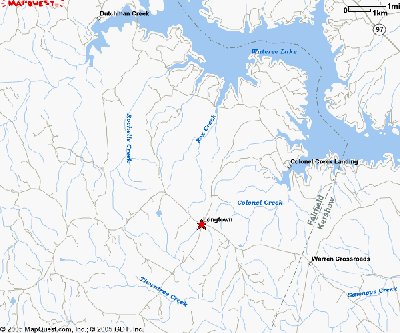 |
|
ROSS, ABNER (Abraham) (1760-1830). Grandfather of Willam Ross Robertson (1818-1885); brother-in-law of Willis Whitaker (d. 1832).Abner Ross, son of David Ross and Hannah Scudder, was born 1 Jun 1760 in Elizabeth, New Jersey. He moved to South Carolina as a young adult and eventually settled in Fairfield District. Writing his will 1 Jun 1824, he mentioned a plantation on Thorn Tree Creek, another plantation on Dutchmans Creek, and a tract of undisclosed acreage and location. According to an inventory of his estate, he owned 35 slaves at death. Elected to the House, Ross represented Fairfield in the 21st (1814-1815) and 22nd (1816-1817) General Assemblies. While in the House, he was a member of the committees on roads, bridges, and ferries (1814-1817) and religion (1816-1817). Locally, he served as the following: commissioner of free schools for Fairfield (1811); commissioner, to superintend repairs of the Fairfield courthouse and jail (1812); and justice of te quorum for Fairfield (1812). On 20 Feb 1794, Ross wed MARY WHITAKER, daughter of JAMES WHITAKER (d. 1782?). They were the parents of nine children: Osmond, Harriet (m. Thomas Robertson [1790-1864]), Molsey (m. W. Durham), David Felix, David Felix II, James Whitaker, twins John Alfred and William, and Elizabeth Martha. Survived by his wife and several children, Abner Ross died 11 Jul 1830." |
WILL OF
|



